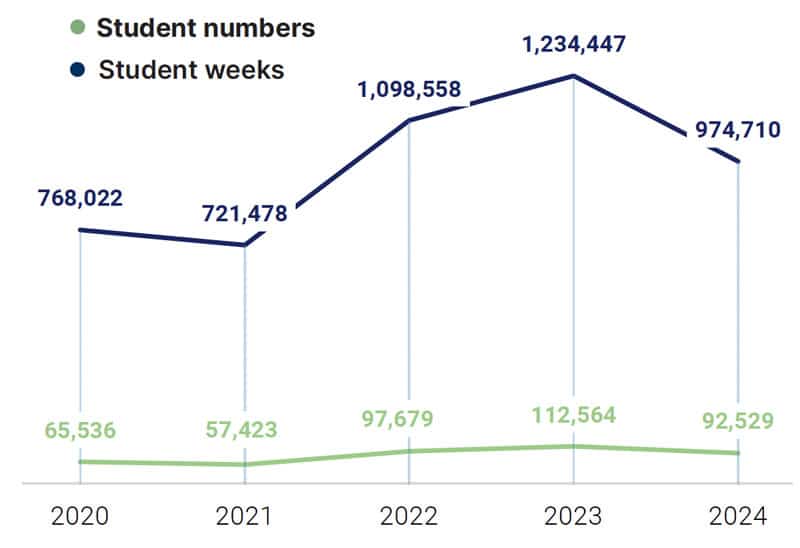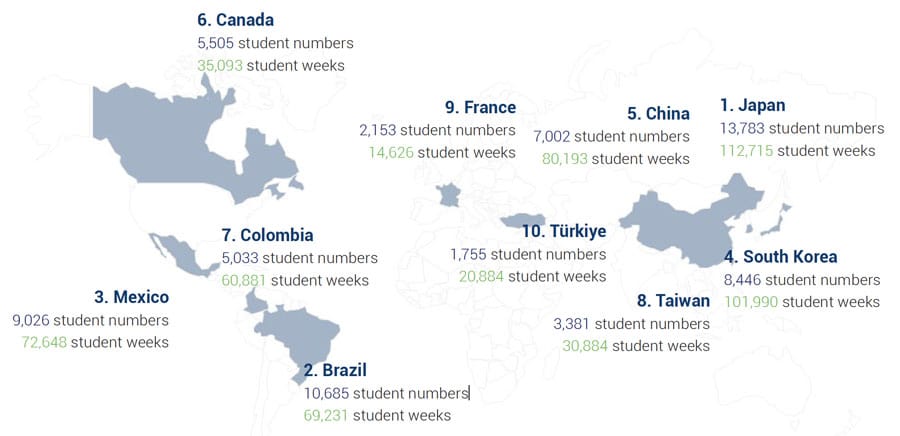Canada’s language sector buffeted by policy changes in 2024
- The number of students enrolled in language education programmes in Canada declined by -18% in 2024, while total student weeks dropped by -21%
- Language centres said that “visa refusals and policy changes” were the major factor in the softer numbers for the year
Amid reports of mounting job losses and programme cuts across Canadian education, the country's language education providers are reporting a significant decline in programme volumes for 2024.
The just-released full-year numbers indicate a -18% decline in student numbers for 2024. Student weeks also decreased by -21% year-over-year.

Those headline figures come from Language Canada's 2024 Annual Survey Report on Canada’s Official Languages Programs – a report that makes plain just how severely impacted the sector has been by the 13 regulatory changes introduced by the Canadian government since January 2024. In fact, 82% of responding language centres cited "visa refusals and policy changes by [[Immigration, Refugees and Citizenship Canada]" as the most significant challenges they faced in 2024.
"Frequent changes to immigration policies and study permit caps are undermining Canada’s attractiveness as a study destination," says Languages Canada. "For language programmes to thrive, and for Canada to remain competitive in the global education market, federal policies must recognize the strategic role of official languages education as a foundation for student success and productivity, a driver of economic growth and jobs, and an essential factor in fostering Canada’s bilingual identity and national unity."
The association estimates that the more than 92,500 students welcomed by member centres in 2024 generated nearly CDN$1.04 billion in direct economic activity through tuition, accommodation, and living expenses.
Languages Canada Executive Director Gonzalo Peralta adds that, "Nothing happens without language, and studies have demonstrated that learning English or French in Canada and having better language skills improve academic performance, workplace productivity, and community integration and safety."
He continues: "Prime Minister Carney has indicated strong support for infrastructure initiatives and our new Minister of Immigration, the Honourable Lena Metledge Diab, has been a strong supporter and champion of language and education in the past. We are hopeful that this new government will steady the ship of immigration and adjust policies so that the integrity of both Canadian immigration and education are respected. Languages Canada is in conversation with IRCC, the Minister’s office, and other government officials to find better ways of producing results that are beneficial for Canada, for institutions, and for students. Our very first and targeted objective is to find a solution to the problem encountered by pathway students (requiring their second study permit in hand before beginning the next step in their journey). We will also be full participants in Minister Diab’s consultation process and take all means necessary to ensure that IRCC is respectful of Canada’s Official Languages Act."
Where do students come from?
The following graphic highlights the top ten sending markets for Canadian language educators. Canada is included among those source markets, reflecting the numbers of Anglophone students that enrol in French studies, and the number of Francophone students who pursue English language studies as well.

Latin America has long been an important driver of language enrolments in Canada, and indeed there were still three Latin markets – Brazil, Mexico, and Colombia – counted among the top ten senders for 2024. More broadly, however, Asia won out as the leading sending region last year, accounted for nearly half of all student weeks (48%) and more than four in ten of all enrolments (42%). Japan remains the number one source market overall, with South Korea and China alongside it in the top five student markets for Canadian language educators.
Languages Canada adds that, "General English/French programmes remained the most popular choice, attracting 76% of total enrolments, up from 71% in 2023. Pathway programme enrolments saw the most significant decline, dropping by 56% and representing just 8% of total student enrolments."
For additional background, please see:
















